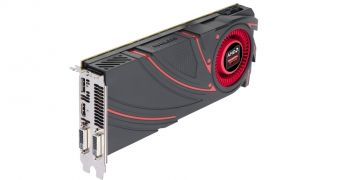The Radeon R9 290X graphics adapter came out back in October and was proven to be stronger than all but the NVIDIA GeForce GTX 780 Ti; yet, buyers might be dismayed to learn that retail cards aren't on the same level.
According to the tests carried out by certain publications, the retail boards start at 1000 MHz sure enough, but they soon go down to 827 MHz or 727 MHz the hotter they get.
That means that, after a few minutes of gameplay, the clock slows down by about 6.5% compared to press samples.
AMD published a statement in which it says that “it is to be expected that the more thermally limited the setting the more variation can naturally occur” but is, nonetheless, investigating the matter because the “degree of variability is higher than expected.”
In the meanwhile, you can rest assured that the actual game performance isn't likely to suffer because of this. Even at lower speed, the card is still overpowered.

 14 DAY TRIAL //
14 DAY TRIAL //